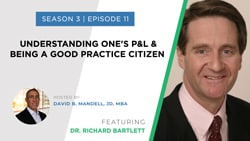In this episode, plastic surgeon Dr. Richard Bartlett joins David to discuss his career, academic and private practice, financial decisions and more.

Richard begins with his background—where he grew up, what got him interested in medicine and surgery in particular—and his lack of interest in finances as he went through medical and surgical training.
Richard explains the process for choosing his first job, including the benefit of learning to “balance the books” even in an academic setting.
He and David then cover his 15 years as an academic surgeon, what he learned financially in creating a plastics foundation from scratch, as well as his decision to create a private practice and the value of “being a good citizen” in making that transition easier.
Richard then spends a few minutes relating the types of financial advice he gives to fellows at Harvard and the advice he would give to all doctors.
What You’ll Learn:
- What interested Richard in medicine generally, and surgery specifically, early on
- Richard’s lack of interest in finance early on and thoughts about medical education related to finance
- How Richard chose his first job out of training- both the clinical and financial benefits of that position
- Richard’s view on the importance of “balancing the books” in any practice environment
- His experience in creating a foundation and what he learned from it
- Why Richard sees “being a good citizen” in the medical organization as important
- The types of financial elements Richard often reviews with his fellows
- Why the initial pay might be the least important of all elements to compare between jobs
- The importance of understanding one’s practice (and personal) P&L and cash flow
Resources:

